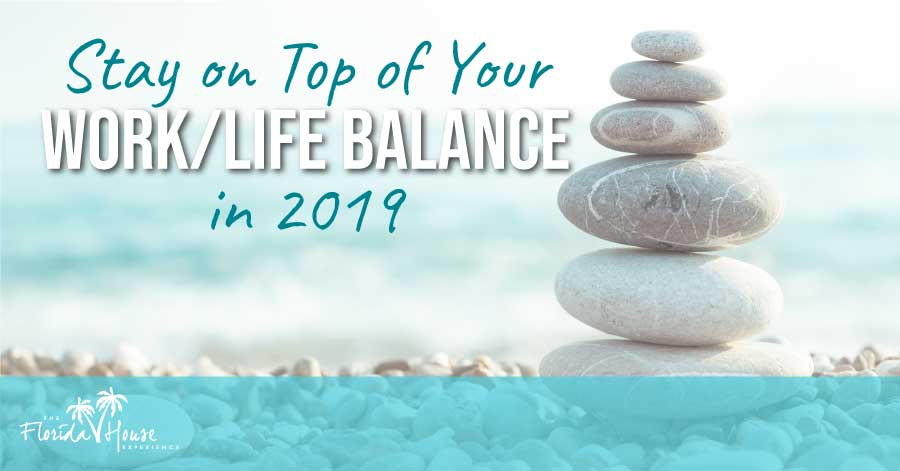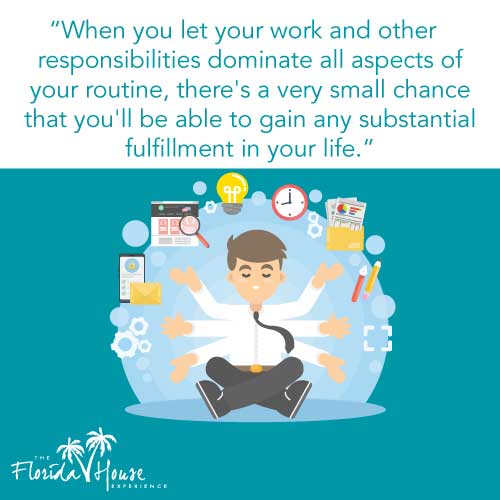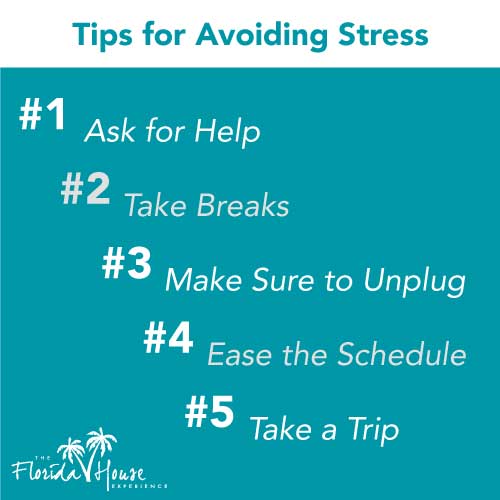
Long-term stress is often overlooked as an explanatory factor for poor mental health. People seek counseling and medication for anxiety and depression without realizing that their condition could be simpler than it seems. Sometimes, mental health disorders can be prevented, or at least lessened, by simply taking a step back and rethinking your day-to-day schedule.
This applies to people in recovery for substance abuse disorders as well — trying to resist the temptation to cope using drugs and alcohol is difficult enough when you’re trying to stay sober. Chronic stress can make it even harder.
Much of this comes down to a concept called “work/life balance,” the proportion of the time we spend at our jobs or performing day-to-day responsibilities and the time we’re able to spend enjoying the presence of friends or family or even simply relaxing.
Why Is Work/Life Balance Important?
 In the most basic terms, when you let your work and other responsibilities dominate all aspects of your routine, there’s a very small chance that you’ll be able to gain any substantial fulfillment in your life. Even companies realize this — it’s common to see job listings advertising “flexible schedule” or “great work/life balance” to attract talent. This is the intangible benefit of an optimal work/life balance.
In the most basic terms, when you let your work and other responsibilities dominate all aspects of your routine, there’s a very small chance that you’ll be able to gain any substantial fulfillment in your life. Even companies realize this — it’s common to see job listings advertising “flexible schedule” or “great work/life balance” to attract talent. This is the intangible benefit of an optimal work/life balance.
There’s data to back up this claim as well: Studies have shown that people who report a poorer balance between their work — in the office or at home — and their ability to relax and take part in things they enjoy suffer from greater stress on a daily basis. This prolonged, chronic stress leads to poor mental health and greater risk of cardiovascular disease the longer it persists.
At best, a poor work/life balance leads to burnout and a steep decrease in productivity. At worst, it can cause potentially severe physical and mental health problems. The bottom line here is that being overworked, whether at your job or in your roles at home, can be very dangerous.
How Can You Avoid This Stress?
 Although awareness of mental health disorders and the importance of quality treatment has grown in society, improving your work/life balance can be difficult. For parents of small children, it’s not always possible to just “take a break.” The same applies to professionals who worry about what easing off the gas in their career will do to future prospects. What’s easy and what’s healthiest for you are rarely the same thing. Improving your work/life balance often means that some difficult decisions are in your future.
Although awareness of mental health disorders and the importance of quality treatment has grown in society, improving your work/life balance can be difficult. For parents of small children, it’s not always possible to just “take a break.” The same applies to professionals who worry about what easing off the gas in their career will do to future prospects. What’s easy and what’s healthiest for you are rarely the same thing. Improving your work/life balance often means that some difficult decisions are in your future.
Here are some tips to reduce chronic stress by improving the balance between responsibilities and recreation.
Ask for Help
You’d be surprised by what can come from admitting to someone close to you that you’re struggling with balancing your career or responsibilities at home with your ability to lead a rewarding life. You may feel like asking for help makes you weak, but it’s important to remember that everyone knows how it feels to be overwhelmed by responsibility.
This usually includes the people to whom you report in your career. That demanding boss who you fear will think less of you if you don’t work long hours? Maybe he or she has dealt with burnout or chronic stress in their own life, or at least understands that the people who work for them are exactly that: people.
If the higher-ups react negatively to your request to reorganize your schedule, step back and think about whether working for this group of people is worth risking your health in the first place.
Take Breaks Whenever Possible
Even if you don’t put stock in a scientifically developed break schedule to maximize productivity, the importance of adequate break time can’t be overstated.
Stepping away from your desk or workstation and taking a short walk, or turning your brain off and browsing social media during a particularly heavy period of work, can recharge your batteries and prevent burnout.
Make Sure to Unplug Every Now and Then
If you’re like a growing number of people and employ technology often in your job, using devices like smartphones when you’re not working blurs the lines between work and relaxation. According to a new study, more screen time is making us worse off, and in an age where communication is instant, everything can seem more rushed and stressful.
Don’t be afraid to put your phone or other devices down in another room and read for a while, or do something outside. Sometimes when it’s not feasible to get more free time in your daily life, you have to settle for capitalizing on the time you do have.
Ease Off the Schedule
One thing that recovering addicts learn that can easily be applied to other populations is that it’s not a good idea to commit to too many things before you know what level of responsibility you can handle. Sure, it may be tempting to make plans every day, but when it becomes less enjoyable and feels more like a chore, being social stops being the boost to your work/life balance that it’s intended to be.
Take a Trip
Whether the bulk of your responsibility takes place at home or at a workplace, having a change of scenery can help stave off chronic stress. Many workers feel like they can’t get away, even if they technically have the option. That’s why 52 percent of the full-time American workforce don’t use all of their allotted vacation days per year.
Even if you can only escape your routine for a weekend, taking a trip somewhere calming and natural can help relieve stress and restore your ability to manage the balance between work and life.
Understand There’s No Perfect Balance
There’s a paradox that can surround the concept of the work/life balance: You can get so invested in trying to fight chronic stress by managing this balance that the balance itself begins to cause more stress.
Obviously, this isn’t healthy. Opportunities in which you can be 100 percent stress-free are extremely rare, especially in a fast-paced world where having a great career or seeming successful is given so much importance.
Next time you feel the pressure to be successful, understand that everyone faces hardships in life. Severe mental health issues, addiction or 60-hour work week — not everything will go smoothly at all times. Work/life balance is about rolling with the punches and making sure you can get the most out of a life that’s rewarding and enjoyable.
When you’re struggling with chronic stress, it’s easy to feel alone. Check out the mental health rehab services available at FHE Health and call us when you’re ready to get help.






